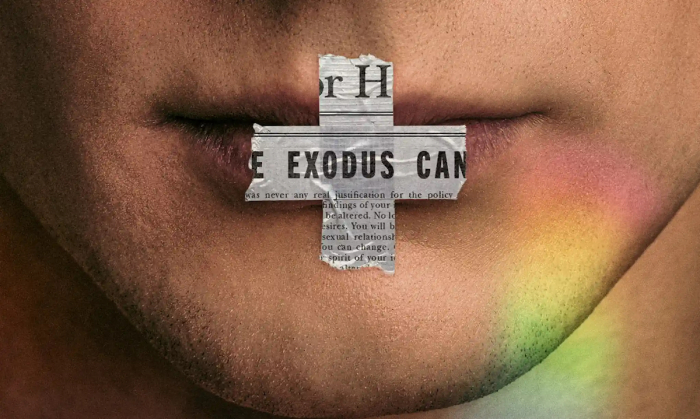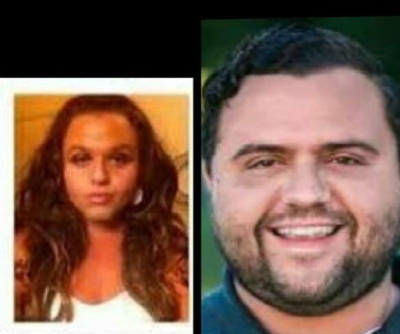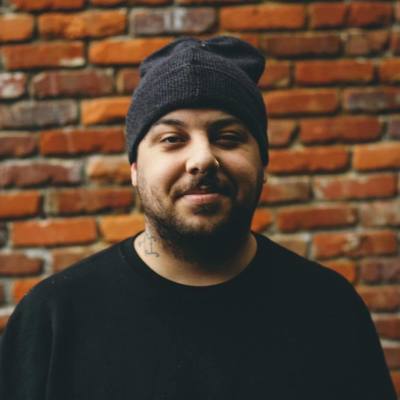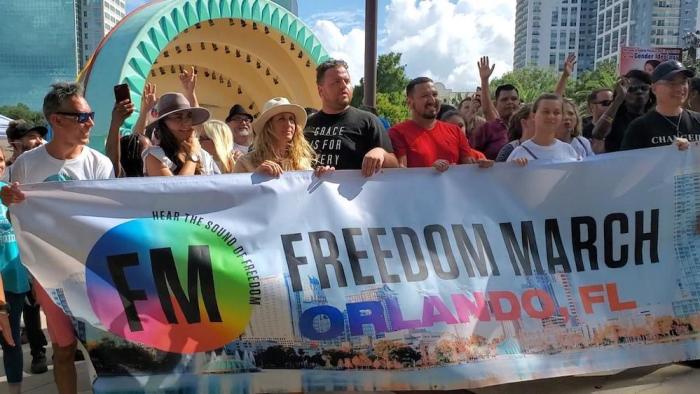Former trans-identified man slams suicide narrative in Netflix film ‘Pray Away’: 'Not the truth'

In the new Netflix film “Pray Away,” corporate media and LGBT activists slam the idea that it's possible for people to leave that lifestyle to follow Christ. One man who once lived as a transgender woman is standing in the gap to declare that he found true freedom through a relationship with Jesus.
“Pray Away” centers around former leaders and followers of the “ex-gay” movement who used conversion therapy and faith to discourage people from leading same-sex lifestyles. Since then, the individuals featured in the film have renounced their past thinking and now openly affirm the LGBT community.
Contrasting such individuals is McCall, who is featured in the film as the minority voice who declares that Jesus transformed him — and he’s not turning back to what he believes is a life of sin.
“I think that it's definitely possible for there to be transformation in people's lives and I think that it's something the Holy Spirit does," McCall, founder of the Freedom March, told The Christian Post in an interview following the premiere of the film.
"People also need to be reminded that the Gospel is not just praying that something just leaves you forever, and you never deal with that temptation again. Jesus said, 'If you want to follow me, you will pick up your cross, deny yourself' and follow Him. So I think that it's way deeper than just prayer and wanting everything to change. I think it's a surrender to Him.”
'This was me'

The film opens with McCall in his hometown in Georgia asking if people need prayer. He then shares his testimony with those who stop to talk to him.
“This was me,” he is heard saying while showing shoppers a photo of himself dressed as a woman. “I lived transgender. Drugs, alcohol, homosexuality — I was really deep in sin, and I left everything to follow the Lord.”
The film goes on to share the stories of those who were once a part of the “ex-gay” movement in the ‘90s. These include Michael Busse, co-founder of Exodus International, an organization founded in 1976 that preached that sexual orientation could be changed; former Family Research Council spokeswoman Yvette Cantu; and John Paulk, who was once considered the face for the “former homosexual” movement.
Paulk and his wife at the time, Anne, were once featured on the cover of Newsweek magazine in 1998 to highlight their change. Paulk later also joined Exodus International, which disbanded in 2013.
The film also features a woman named Julia Rogers, who marries a woman in a church at the end of the film. Rogers used to be a part of the now-defunct Exodus International along with another featured speaker in the movie, Randy Thomas, who is now engaged to a man.
Because of the movie’s overtly pro-gay message, the secular media is equating McCall’s "freedom marches" with conversion therapy.
However, McCall says Freedom March is meant to share testimonies of transformation in Christ while equipping the body of Christ to deal with the LGBT community and offer a safe place for same-sex attracted individuals to come to the knowledge of Jesus Christ.
“With Freedom March and what the new current movement is doing is more about wanting to see people born again, wanting to see an internal spiritual transformation,” McCall said.
"Later on, yes, that affects things we do and our actions, but I think that we're more focused on the spiritual transformation instead of like rules and obligations.”
When approached by director Kristine Stolakis to be a part of the film, McCall said it was “really organic.” Stolakis sought to investigate the movement because her late uncle, who she described as a second dad, was a conversion therapy survivor.
"We were actually in Los Angeles, California, having our Freedom March in November of 2018 and [Stolakis] reached out and she asked if she could film the Freedom March. I told her that she could,” he revealed.
"It grew from there, where she asked if she could come to my hometown in Georgia and film me ministering. Then, they came in started filming me speaking at churches, and then they came and filmed my book signing. They just came and filmed a lot of things, and just worked it into the story,” the For Such A Time author continued.

However, Gabriel Pagan, an associate pastor at Love Revolution Church in Columbus, Georgia, who also serves as an armor-bearer for McCall during the marches, said he felt the production team of “Pray Away” were not honest about their intentions of filming McCall and their team.
“Filmmakers said they wanted to film the documentary, but they never pitched it in that way,” Pagan told CP. He said filmmakers never revealed their intention to highlight the idea that telling people they could be free from a lifestyle of homosexuality “leads to suicide.”
"It was just interesting that there's nobody [in the film] who's like, 'Hey, I used to be in the lifestyle, I left. I'm not suicidal. I'm happy. I might get temptation, but I'm actually happier now. I'm not as obsessive. I'm not as narcissistic and focused on my image. There are not multiple viewpoints, it's just one,” Pagan, a former homosexual himself who found freedom in Christ, noted.
Though McCall and his team were shown in the film, none of them were asked to respond to the film's pervasive narrative.
"I don't mind being in the film. But it feels manipulative to play like weird background music as if I'm in a cult,” Pagan stated.
“I wouldn't just immediately put on like gay bop or something [to show] 'Oh, wow, these guys are extra LGBTQ.' It just felt like, obviously, there's an agenda. But if you're for equality and for different viewpoints, you don't have to enhance or monopolize, or go above and beyond to make somebody that you disagree with look evil. And this definitely demonized people more than it brought any kind of reconciliation.”
McCall said the filmmaker told him that there "were people that didn't really want to show his side," adding: "But she felt it was essential if they're going to share those stories to share about the current former LGBTQ movement.”
After watching the film a few times, McCall stated that he feels “like in these former ministries the goal was, 'You need to become straight and heterosexual you need to get married and have children and you need to dress like this and you need to look like this.”
However, he stressed his message to the LGBT community is more about transformation in the heart through Jesus Christ.
With the exception of McCall, Pagan pointed out that, "if you look at the documentary almost nobody talks about their own personal relationship with God outside of getting what they wanted."
"So everybody in the documentary talked about themselves," Pagan remarked. "Jeffrey is the only one who was like, 'Jesus, Jesus, Jesus, Jesus.'”
McCall also took issue with the fact that “Pray Away” highlights current Christian churches that openly affirm the gay, lesbian and transgender lifestyles.
"I just think there's a huge difference [between] following Jesus, or when you just know about Jesus,” McCall contended.
"I think having an intimate relationship with Him, knowing what He wants for you and just obeying Him, it's just such a difference from knowing about Jesus as this historically good-man-figure that you like some of the stuff He says, but you don't listen to all of what He says. So I think there's a clear-cut line drawn in the sand of people that really know Him and follow Him and obey Him and people that just know about Him.”
'I just chose to follow Him'
Pagan said he never had any Christian guidance, let alone conversion therapy, when he chose to surrender to God.
“I just chose to follow Him. I didn't have anybody telling me, 'This is what it looks like.' Nobody around me had had my experience. I was the only person in my church who had what I had and I didn't even talk to anybody, except my pastor, until I started sharing my testimony,” Pagan said.
“The only reason I became vocal about it is because so many people, after I shared my story, were like, ‘I'm struggling, I'm married, and I'm struggling, how do I deal with this?’”
Pagan argues that the documentary pegs Freedom March as “just bad pseudo therapy.” But the movement is the opposite, he said. Rather, it is a community that brings people together who were always in need of connection but sought out sinful practices to get them.

The Netflix documentary highlights a phone conversation McCall had with a woman who revealed her 20-year-old child is now transgender. He warns the concerned parent there is a spirit that wants parents to bow to misgendering their own children.
"I definitely explained to the mother that there's a spiritual side of the transgender part that she was addressing, that wants the person to want other people to bow down to it,” McCall detailed.
"There's actually spirits behind this deception, and they want to push you into calling that person something that they're not. There's definitely a spiritual oppression that comes on people.”
"It's almost like a crime now to misgender somebody, but somebody in the gay community can tell me I'm gay and misaligned my sexual identity because they have pain from religion or a church,” Pagan added. “I know it's projection. I know it's anger.”
The minister revealed that several people online have accused him of faking his deliverance from homosexuality, but stressed that he's "not making money" in being vocal about his freedom.
“But at the same time, I met Jesus, He didn't make me do a mantra over my body until my genitals responded a certain way," he detailed. "He didn't make me do anything weird. I just felt His presence. He said He had a plan for my life. He said He loved me, that He was always with me. I asked Him where I was when I was molested. He showed me, He gave me the heart for somebody who hurt me. He asked me, would I be willing to give Him everything?”
To that question, Pagan said he responded, “Sure.”
"Why is it okay for you to step on my relationship with God? Why is it okay to literally tell somebody who they aren't just because you disagree with them? Like, isn't that what you get offended [by]?” he questioned his critics.
Jeannie Ortega Law is a reporter for The Christian Post. Reach her at: jeannie.law@christianpost.com She's also the author of the book, What Is Happening to Me? How to Defeat Your Unseen Enemy Follow her on Twitter: @jlawcp




























